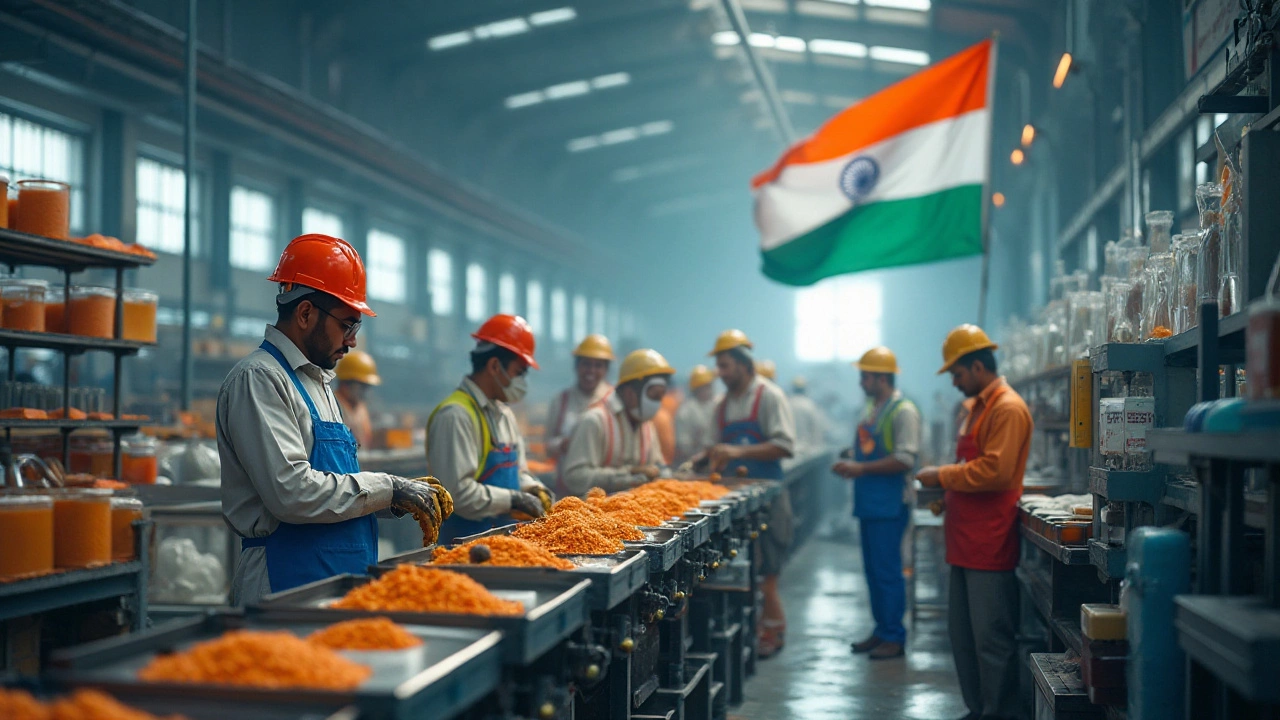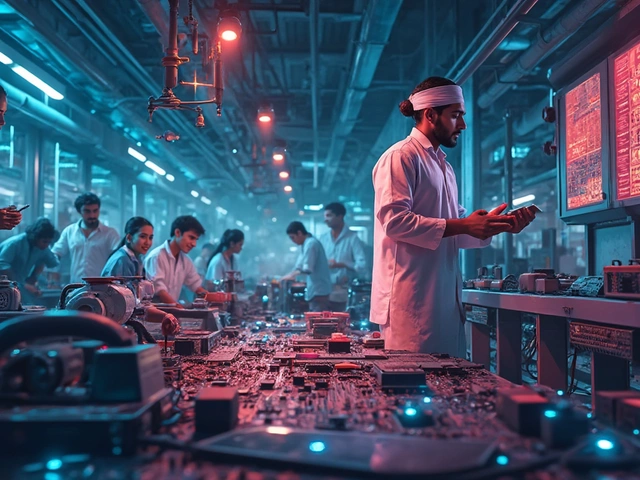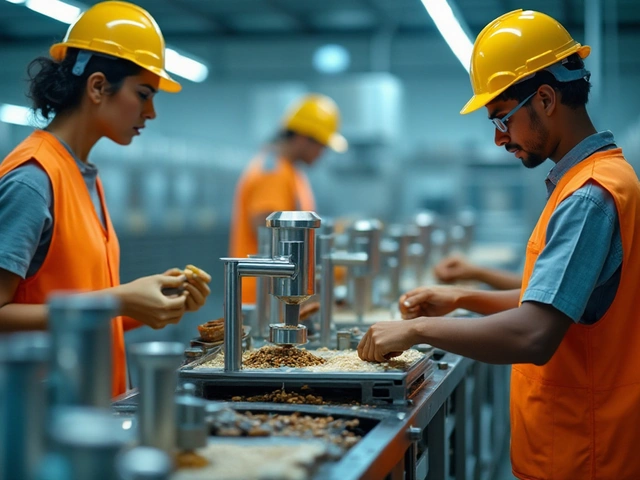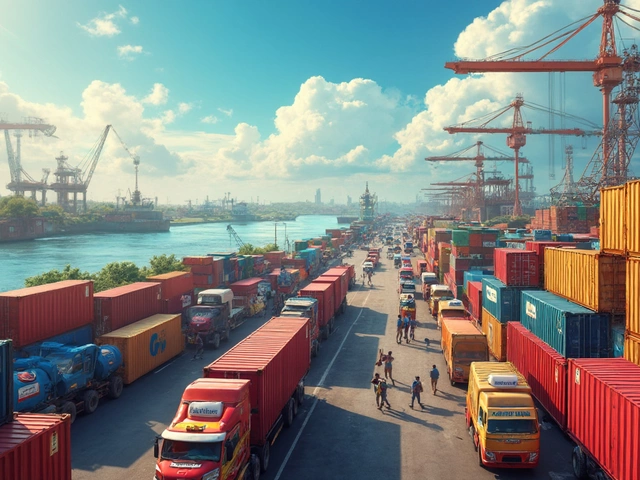India has emerged as a significant powerhouse in the world of manufacturing. Among the multifaceted manufacturing domains, the chemical industry stands out for its rapid growth and global impact. Indian chemical manufacturers have established themselves as key players on the world stage, contributing significantly to the country's economy.
But what exactly has put India on the global map in terms of manufacturing strength, particularly in the chemical sector? To understand this, we need to delve into various aspects that shape this narrative—ranging from economic policies to the talent driving innovation and sustainability.
The journey isn't without its hurdles. Infrastructure limitations and regulatory intricacies pose challenges that manufacturers face daily. Yet, India's robust advancements in manufacturing, bolstered by government initiatives and investments, paint an optimistic picture for the future of its chemical industry.
- The Rise of Indian Manufacturing
- Current Landscape of India's Chemical Industry
- Key Players in the Indian Chemical Sector
- Government Policies and Economic Impact
- Challenges Facing the Industry
- Future Outlook for India’s Chemical Manufacturing
The Rise of Indian Manufacturing
In the last two decades, India has witnessed a remarkable transformation in its manufacturing sector, positioning itself as a key player in the global arena. This change can be traced back to strategic policy shifts and governmental reforms aimed at liberalizing and invigorating the economic landscape. As India opened its doors to foreign investments, multinational corporations started to perceive India not just as a sizable market, but as a prime location for sourcing and production. The sheer scale of India's talent pool - a vibrant mix of skilled engineers, scientists, and workers - played a crucial role in laying the groundwork for this metamorphosis. These individuals bring not only technical expertise but a youthful dynamism that fuels innovative thinking across industries.
Within the vast expanse of India's manufacturing prowess, one cannot overlook the burgeoning chemical industry. Indian chemical manufacturers have carved a niche for themselves, making India one of the top nations in terms of chemical exports globally. This sector's growth is fueled by a combination of factors, including abundant raw material availability, competitive production costs, and a strong domestic market demand. The government's significant initiatives, like the 'Make in India' campaign, have further aided in accelerating growth, fostering an environment ripe for industrial advances.
The ambitious policies and infrastructure upgrades, while significant, are only part of this story. A pivotal factor in this surge is the commitment to sustainable growth. There has been a concerted effort to ensure that environmental considerations are at the forefront of industrial expansion plans. The government, along with industry leaders, is emphasizing the importance of 'green manufacturing', encouraging companies to adopt cleaner technologies and sustainable practices. This focus on sustainability is not just about regulatory adherence but a strategic move to align with global trends, as buyers and consumers increasingly prioritize eco-friendly products.
The statistics bear testament to India's strengths. According to a recent report by the Indian Ministry of Commerce and Industry, India has consistently been among the world's top three chemical producers. The sector has maintained a steady growth trajectory, with an average annual growth rate of 8%, driven by significant innovations and expanding market reach.
Key Influencers Driving Growth
Several key influencers contribute to this robust growth. First, the strategic geographic location of India makes it an ideal hub for exports to both Western and Asian markets. Equally important is the evolving customer landscape, where the demands for diverse and high-quality products have propelled Indian manufacturers to increase efficiency and innovation. Government policies have also played a crucial role, with initiatives like the Goods and Services Tax (GST) reducing operational hurdles for businesses, thus fostering a smoother and more integrated market environment.To capture this diverse and dynamic industry landscape, the government has also rolled out technology-driven schemes that facilitate knowledge sharing and skill enhancement. The rise of industrial clusters specialized in chemical production has expanded local economies, creating a ripple effect that boosts ancillary sectors. As Indian manufacturing advances in its journey, it continues to draw on its illustrious history of craftsmanship and industrial capabilities, adapting these to meet modern demands and strengthen its standing on the global stage.
Current Landscape of India's Chemical Industry
India stands prominently at the forefront of global chemical production, staking its claim as one of the world's fastest-growing markets. The chemical industry in India is crucial for its economy, contributing significantly to both industrial and agricultural sectors. With an estimated market size of around $300 billion as of late 2024, India's chemical sector is thriving. This growth is driven by demand both domestically and internationally, with key industries like agriculture, textiles, and pharmaceuticals heavily reliant on chemicals. The industry serves as a backbone, providing essential raw materials such as fertilizers and polymers, which support the broader manufacturing landscape.
Notably, Indian chemical manufacturers have made substantial investments to adopt advanced technologies and sustainable practices, bolstering their ability to compete globally. Driven by innovation, companies are increasingly focusing on green chemistry and sustainable production techniques. This aligns well with global efforts to reduce environmental impact and meet consumer demand for more sustainable products. The presence of a vast skilled workforce and favorable government policies like the 'Make in India' initiative has also substantially contributed to this sector's growth. With these factors combined, the industry continues to see impressive strides in both production capacity and technological sophistication.
The geographic advantage of India cannot be understated. Located strategically between the Middle East and the rest of Asia, it serves as a natural hub for exports of chemicals to various regions. Exporting over 50,000 products to more than 175 countries, Indian chemical companies have established a commendable reputation for quality and reliability across the globe. As such, international markets view India as a key partner in their supply chains. A report by KPMG highlighted, "India's chemical industry is not only a significant contributor to the national economy but is also pivotal in shaping global supply dynamics." This reflects the industry's importance in the broader context of India's economic performance.
One cannot ignore the sector's challenges, as infrastructure remains a critical issue. Existing networks struggle to meet the demands of rapid industrialization, and logistics costs are higher compared to global standards. However, manufacturers are tackling these challenges head-on through strategic collaborations and public-private partnerships aimed at infrastructure development. Additionally, complex regulatory frameworks, while evolving, pose difficulties in efficiently maneuvering through business operations. Yet, Indian manufacturers are adaptive, leveraging their innovative spirit to navigate these complexities and remain resilient in the face of global competition.
In terms of export dynamics, the industry's remarkable growth is reflected in India being the world's sixth-largest producer of chemicals. This status is bolstered by a diverse product mix that includes specialized chemicals like dyes, pigments, and agrochemicals. Market leaders like Tata Chemicals, Reliance Industries, and UPL Limited continue to spearhead this explosive growth, building strong global footprints. These companies are putting an emphasis on research and development, further strengthening their competitive edge. This ongoing commitment to innovation ensures the industry's sustained momentum and the delivery of high-quality products that meet international standards.
The future looks bright for India's chemical sector as investments in capacity expansion are expected to continue. Moreover, the government's vision to increase the sector's GDP contribution through policy support showcases a commitment to elevating this industry. There is a growing focus on creating specialized clusters and securing foreign direct investments to boost sectoral growth. By prioritizing these strategic efforts, India aims to achieve its ambitious vision of becoming a global manufacturing hub, particularly in chemical production.

Key Players in the Indian Chemical Sector
The Indian chemical industry has no shortage of key players. These companies not only propel the nation’s economy and innovation but also have a substantial impact on the worldwide market. One of the most prominent names is Reliance Industries Limited, which has made significant strides in petrochemicals production. It’s a behemoth with integrated operations that spread across the entirety of the oil-to-chemicals value chain. A forward-looking approach, coupled with strategic investments in state-of-the-art technology, has enhanced its dominance, underpinning a significant proportion of the national output.
Another heavyweight is Tata Chemicals, renowned for its diverse portfolio that spans basic chemistry products to consumer nutrition. The company's approach has always been future-oriented. Tata Chemicals focuses on sustainable chemistry with projects aimed at agriculture-related products and consumer well-being. The company's relentless pursuit of sustainable methods showcases its role as an influential player in this industry, ensuring the health of the planet isn't compromised while meeting global demands.
India also finds strength in Aarti Industries, which specializes in the production of specialty chemicals and pharmaceuticals. The company’s dedication to excellence in customer satisfaction and sustainable practice makes it a leader within its sector. Aarti Industries employs innovation and a customer-centric approach, collaborating closely with partners to ensure its place at the center of the value chain. Such companies play crucial roles in shaping the landscape and direction of chemicals globally.
Coromandel International is an influential name in the manufacturing of fertilizers and crop protection chemicals. Their expertise in the agricultural sector supports the backbone of India’s economy. With a sharp focus on catering to the agricultural demand—India being a significant contributor to the world's agrarian market—the company's role becomes pivotal. They employ advanced technology to ensure efficient crop protection methods, which in turn supports farmers and boosts crop production efficiency.
Moreover, Pidilite Industries Limited, synonymous with products such as adhesives and sealants, marks a strong presence not just in India but also as an exporter to various global markets. Their household brand, Fevicol, has been a revelation, becoming a generic name for adhesives in India. Such market penetration exhibits the company's adeptness in addressing consumer needs specifically and efficiently. The innovative use of raw materials more efficiently ensures that their products remain at the forefront of the consumer's mind, making them a powerful staple in households and industries alike.
According to an article in The Economic Times, "The Indian chemical sector is expected to double its share in the global market, rising from 3.5% to 6-7% over the next decade." Such a bold prediction underscores the potential and promise these key players hold within their operational prowess and strategic development.
A look at a few key players in this chemical industry landscape shows India’s strength in diversity. With various companies focusing on different branches—from agriculture and consumer goods to specialty chemicals and pharmaceuticals—the chemical manufacturing sector paints a picture of innovation, sustainability, and economic fortitude. These companies are not just economic drivers; they are also trailblazers in sustainable practices, catering to a global consumer base with disparate needs. The synergy seen within this sector serves as a testament to its considerable impact on the industrial landscape worldwide.
Government Policies and Economic Impact
India's government has recognized the chemical industry as a crucial sector for national economic growth, launching several initiatives to bolster its development. The creation of policies has been aimed at encouraging investments, simplifying regulations, and making business operations smoother for both domestic and international players. One such significant initiative is the
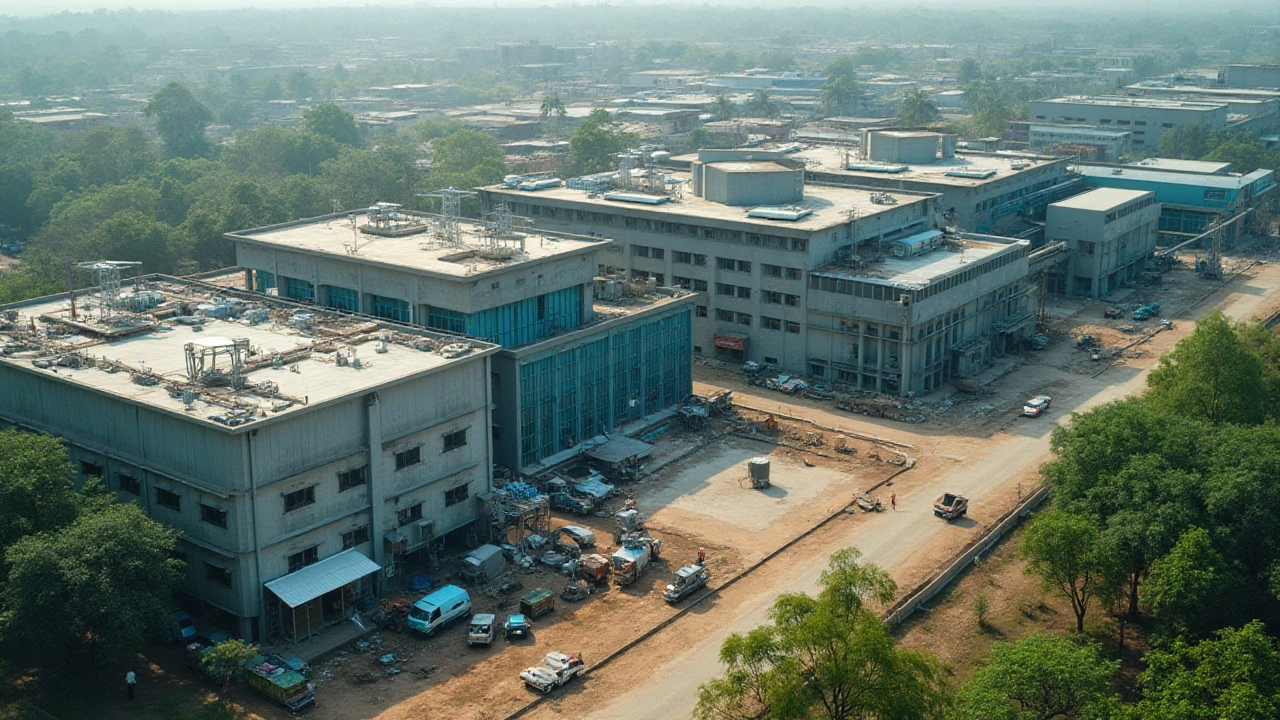
Challenges Facing the Industry
The Indian chemical manufacturing sector, despite its strides, contends with a myriad of challenges that impede its path to full potential. One of the most glaring obstacles is the infrastructure deficit. Though the government has made significant improvements, there are still substantial gaps in transport and logistics which lead to inefficiencies. The lack of an efficient logistics network increases operational costs and extends lead times, making it difficult for Indian manufacturers to compete effectively on a global scale. This is particularly problematic when large-scale distribution is considered, as delays can impact not only bottom lines but also reputations on the international stage.
Adding to the complexities are stringent regulatory frameworks, which are essential for maintaining high safety standards but often result in bureaucratic red tape that delays project implementation. This can have an adverse effect on innovation, as companies might hesitate to invest in complex processes that could become mired in lengthy approval stages. The delicate balancing act between maintaining safety and encouraging innovation tends to tip towards caution, which can sometimes stifle the rapid evolution the industry needs to stay competitive with global leaders.
Moreover, environmental concerns pose a significant challenge to the chemical industry. With increasing awareness and stricter regulations on emission standards, Indian manufacturers find themselves in a tight spot. Efforts to produce cleaner, greener technologies are met with the challenge of modernizing existing plants, which requires substantial investment. This can often be prohibitive, particularly for smaller firms that lack the necessary capital but still face the same stringent environmental regulations as larger players. Indian chemical manufacturers are under pressure to meet these evolving expectations while balancing costs and compliance.
Skilled manpower is yet another pressing challenge. While India boasts a vast pool of talent, there is a notable skills gap specific to the chemical industry. This gap highlights a disconnect between academic training and industry needs. Many companies invest heavily in on-the-job training to bridge this divide, but this increases their operational costs and can affect their competitiveness. This talent scarcity is not just in the domain of research and development but also in technical roles critical to maintaining efficient and safe manufacturing operations.
An often-overlooked challenge is that of fluctuating raw material prices. Chemical manufacturing is heavily reliant on a range of raw materials, and any volatility can significantly impact the profitability of companies. Given that some of these materials are imported, the industry is also vulnerable to foreign exchange fluctuations, which adds another layer of financial risk. Companies must navigate these economic waters with savvy, employing strategic sourcing and hedging techniques.
“India holds immense potential in manufacturing, but to unlock it, the intricate challenges of infrastructure, regulation, and skill development need addressing,” said industry expert Rajeev Menon, when speaking at the Global Manufacturing Summit this past year.It is clear that while the road is fraught with obstacles, there is also a wealth of opportunity for Indian chemical manufacturers. Addressing these challenges requires a collaborative approach between industry players and the government, ensuring policies bolster growth while encouraging innovation, sustainability, and efficiency.
Future Outlook for India’s Chemical Manufacturing
The future of India’s chemical manufacturing sector looks promising, marked by anticipated growth and evolving capabilities. A blend of rising domestic demand and increasing global presence sets the stage for profound development. The country is expected to double its chemical production in the next decade, driven by advancements in technology and the surge in end-user industries. As India positions itself as a hub for global supply chains, the chemical industry remains pivotal, backed by governmental proactiveness which prioritizes sustainability and capacity building.
The global market for chemicals is evolving, and India’s ability to innovate plays a crucial role. Companies are increasingly focusing on research and development, seeking innovative solutions that cater to both local and international needs. A significant trend is the adoption of green chemistry and sustainable products, as the industry aims to meet stringent environmental standards globally. The emphasis on sustainable practices not only facilitates environmental conservation but also opens new markets and attracts environmentally-conscious investors.
Noted for rapid industrialization, India stands to benefit greatly from its strategic geographical advantage. Positioned equidistant between key markets in the Middle East and Asia-Pacific, Indian chemical manufacturers can optimize logistics and reduce costs. This geographical leverage, coupled with a vast skilled workforce, offers a competitive edge. Recent reports suggest that by 2030, India could rank among the top global chemical exporting nations, with exports projected to grow by 15% annually.
The government has introduced policies aimed at nurturing domestic industries and integrating with global systems. Initiatives such as the ‘Make in India’ campaign target increased investment, skill enhancement, and infrastructural improvements across the manufacturing domain. Tax incentives and relaxed regulatory norms further foster a business-friendly environment, encouraging both domestic and foreign investments.
"With visionary policies and immense growth potential, India’s chemical industry is poised to lead the way in sustainable manufacturing," notes Rajesh Kumar, a respected industry economist.
Technological innovation stands at the forefront of India’s manufacturing revolution, with a distinct focus on digital transformation. Industry 4.0 tools like IoT, AI, and big data analytics are redefining operational efficiencies and driving significant cost reductions. Automation and smart manufacturing practices amplify production capabilities while ensuring enhanced quality control. As chemical manufacturers invest in future-ready infrastructures, they inevitably bolster the industry’s growth trajectory.
Yet, challenges persist, with infrastructure limitations being one of the most acknowledged hindrances. Developing robust supply chain mechanisms and ensuring efficient energy management are key areas that require attention. By addressing these challenges, India can significantly enhance its manufacturing prowess. The integration of sustainable practices, technological advancement, and supportive policy frameworks collectively fortify India's path to becoming a leading global player in the chemical manufacturing sector.
